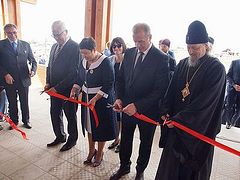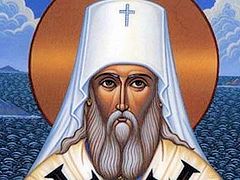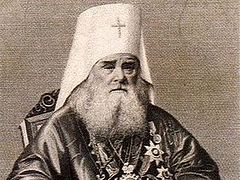September 23 / October 6 is the feast-day of the Holy Hierarch Innocent (Veniaminov; 1797-1879), a great missionary, the Apostle of America and Siberia, Metropolitan of Moscow and Kolomna. His path of life was an unceasing, difficult podvig [spiritual labor]: he spent forty-five of eighty-two years of his life in journeys, preaching the Word of God to the peoples of Russia’s extreme north, Alaska and Aleutian Islands. He brought culture and education there. He proved to be a living example of the great and “broad” Russian soul which can accept everybody and serve all with its generous heart.
Below is an extract from the book, entitled Serving Your Motherland: a Collection of Letters, by Holy Hierarch Innocent (Veniaminov), published by the Publishing House of Moscow Sretensky Monastery.
Letters to Metropolitan Philaret (Drozdov)
Your Eminence, dear Vladyka, the most merciful archpastor and father!
Glory be to God, my travels across Asia which began on August 31, 1846 (except for the sea voyages) have safely ended; on July 5, 1847, I returned to Ayan and now I am waiting for the vessel’s departure. Now I had to travel 2,500 extra versts [c. 1,657 miles] partly because the Diocese of Kamchatka has grown in comparison with 1843—it stretches southwest of Okhotsk as far as the Chinese border—and partly because I feared to go to Ayan directly from Okhotsk as it was late and most of the way lay through the River Maya. That is why I took the Okhotsk Way most of time, nearly as far as Yakutsk; only 140 versts [c. 92.8 miles] were left. From there we turned to the new Ayan Road (built by the Company) which will be much better than the Okhotsk Way with time. I won’t mention the summer road from Ayan to Yakutsk; instead of thirty to thirty-five days of riding (as it was on the way from Okhotsk), now I need to travel only 250 versts [c. 165.7 miles] from Ayan on a cleared road at most within six days, and then to take a boat and sail as far as Yakutsk. It is important that the state pay attention to Ayan and the Ayan Road and move the stations here from the Okhotsk Road.
We left Okhotsk on March 26 and arrived to Ayan on May 5. The spring foul weather made me abandon the wagon and take an ordinary wood sledge, with an umbrella of canvas, and to travel on horseback, by reindeer, by dog (at one point we used oxen to transport a hoard). I feared that my eyes would see worse because of the bright sunlight reflecting from the snow, but glory be to God, I did not suffer from that at all; and all former concerns and apprehensions are now forgotten and I am ready to go again; and, if God wills, I would be willing to make the third journey.
On my arrival to Ayan I had an opportunity to visit the Uda district which had just been separated from the Diocese of Irkutsk. And I took that opportunity. On June 6, I and my escort embarked on a kayak; on June 17 we arrived at the mouth of the River Uda, and two days later we finally reached Udskoye, situated ninety versts [c. 59.66 miles] from the mouth. There the Lord helped me consecrate another newly-built church (it was the fourth time in my present journey); on June 26 we sailed from the mouth of the River Uda on kayaks and boats and came to Ayan on July 5.
The life of the Uda district’s residents is deplorable (in both the physical and spiritual sense). The predisposition of the local peasants and settlers to alcoholism is so strong that they spent almost all the money (travelling allowance) that I had given them (exhorting them to use it for their good and the good of their impoverished families) on alcohol.
The only thing that comforts me regarding the Udskoye parishioners is that the peasants and settlers are not numerous and the majority of them are Tungus (Evenki), who are as good-natured as their brothers living between Gizhiga and Okhotsk.
The Light of the Gospel is now being spread even beyond the Chinese border (though it is not my work). During his journeys across the parish the Udskoye priest has an opportunity to meet (at the Burukan Hole) with Nigidals and other national minorities living on the territory of the Chinese Empire who come there to carry on their trade. During every meeting the priest speaks with them about the salvation of soul, and his talks with the blessing of God have yielded results: in 1845 (when the Udskoye church was incorporated into the Diocese of Kamchatka) nine of them were baptized and in 1846 three more people were baptized. One of them displayed exceptional zeal in preparing for the holy baptism.
The Lord is blessing the feasible undertakings and efforts of our missionaries by their visible success. Throughout 1845 and the first half of 1846, more than 1,000 people were baptized, including over 100 Asian Chukchis (in Anadyrsk). The Kvikhpak mission made the greatest number of converts (298 in all) and there are still many catechumens. 199 people were converted by a Nushagak missionary who due to his illness has recently been sent to Kodiak, and his place is now vacant. A Kenai missionary from whom I have not yet received any official reports (Hieromonk Nikolai whom I took from Bethany) is zealously carrying out his duties and in the initial period of his missionary journeys he baptized over 200 Kenai residents and anointed seventy-five residents with the Holy Chrism. The arrival of a priest to Sitka in place of Hieromonk Misael allowed the local priest, Peter Litvintsev (who had been transferred from Kodiak), to arrange spiritual talks with the Koloshi (the Tlingit); thanks to his labors, thirty-six people have been baptized this spring, and, according to the priest’s reports, many women want to be baptized too. The church which is being constructed for them outside the fortress will be completed soon. And the Kaloshi are demonstrating their zeal by helping with delivering wood and so on. It gives me joy because they initially did not want a church for a long time; so I was not expecting them to assist in the building of the temple. Therefore, by the mercy of God, I hope to consecrate the new church soon after my return to Sitka, scheduled for August 26. We are going to set off from Ayan on July 24.
Entrusting myself to the prayers of Your Eminence, I have the honor of being the most humble and obedient servant of Your Eminence, most merciful archpastor and father, with filial loyalty and love,
Innocent, Bishop of Kamchatka
The port of Ayan, July 22, 1847
* * *
Your Eminence, dear Vladyka, most merciful archpastor and father!
Again and many times glory and thanksgiving to the Lord, Who has kept and keeps me even to this day in many diverse ways in all my doings! He has helped me to make my third journey across the Asian part of my diocese, which was safe and successful. Despite the changes in the weather, seasons and so on, none of my companions experienced any serious discomfort or had any unpleasant incidents throughout the journey; both myself1 and those who accompanied me2 remained safe and sound. On August 8, 1850, I went to the River Kamchatka to look around the local churches; at first we rode saddle horses for some 200 versts [c. 132.5 miles] and then took boats along the River Kamchatka. On August 28, I returned to Petropavlovsk where I stayed until November 14 without going away for an instant. On that day my winter journey began; first we rode in sledges pulled by dogs to the Koryaks, then proceeded by reindeer, next again by dog and finally reached Ayan by reindeer. From January 18 to 30, I stayed in Gizhiga; from February 25 till March 8 I stayed in Okhotsk, and finally, on April 3 I arrived to Ayan; and then my travels by land ended. I took a new route from Okhotsk to Ayan—that is, down the River Maya to Nelkan where the Tungus lead a nomadic life; they belong to the church of Okhotsk and, therefore, the Kamchatka Diocese’s jurisdiction.
Speaking of my journeys, I cannot pass over a story that brought much relief to my heart in silence. Setting out from Petropavlovsk for the last time, I (judging by the season and other circumstances) couldn’t expect that I would be able to get to the Dranka settlement by December 15 (the tenth anniversary of my consecration as a bishop); it is there that a new church in honor of the Holy Hierarch Innocent [St. Innocent, the first bishop of Irkutsk; c. 1680-1731] has been under construction since 1849 on the site of an old church of St. Innocent. But the Lord Who astonishes me a sinner with His mercies, deigned to show me this mercy too: quite beyond my expectations I arrived to Dranka in the morning of December 13 exactly on time, and on December 15 I consecrated the new church in honor of my patron-saint with the help of God. All the elders of all settlements along Olyutorsky Gulf arrived by the time of the consecration. Due to their isolation they come to church services very seldom, and so it was the first hierarchal service that they attended. I take it as the greatest reward for my journey despite my unworthiness.
My journey is over. But what can I say about it on the whole?.. An enormous distance has been covered (over 6,000 versts / c. 3,977 miles in total, not including the past and forthcoming sea routes; but with them it is 19,700 versts / c. 13,058 miles altogether); much time has been spent (almost ten months), much money has been spent (over 3,000 rubles in silver as travel allowance); and I have put the local inhabitants (who ministered to me during my journeys) to a lot of trouble. But will this work be of benefit to many? That is no concern of ours; for it is not our business to cultivate; our business is to work, and I have tried my best to work hard. Thus, I celebrated the Liturgy at all the churches that I visited, and I performed prayer services and vigils in all the chapels, and thereupon I offered instructions in faith. I reminded the inhabitants of each settlement that I passed through of the purpose of our life on earth. And I prayed for and blessed every single Tungus that I met on my way, mostly in deserted places, and this time they were in great numbers; I performed open-air prayer services for them and so forth. <…>
Entrusting myself to the prayers of Your Excellence, I have the honor of being the most humble and obedient servant of Your Excellence, most merciful archpastor and father, with filial loyalty and love,
Innocent, Archbishop of Kamchatka
The port of Ayan, May 21, 1851”
* * *
“Your Eminence, dear Vladyko, most merciful archpastor and father!
Hieromonk Sergy, who was sent by me to the Kuril Islands in 1850, has just returned and told me that the All-Merciful Lord, for the consolation of Kuril inhabitants and the strengthening of the faith of His tiny flock (there are a total of sixty Kuril inhabitants of both sexes), deigned to show them a visible sign of the power of the Holy Cross and the blessing of the Church. The island where the hieromonk spent the winter has no river (it has no permanent residents either), and travelers usually use the water of a local lake. And there were so many small insects and bugs in that lake that its water couldn’t be used without passing through a filter. It was this way until January 6 [the feast of the Theophany] of this year, 1851. On that day, the Blessing of its Waters was performed according to the Church rules. And at that very hour all the insects suddenly vanished. There were absolutely no insects in the lake throughout their stay there until May 21 and through their second stay on it on the way back from the eighth island to Shumshu on July 2.
It was the violent autumn wind that forced the hieromonk and his companions to winter on that island. And as neither mammals, nor birds, nor fish live on or near this island, Hieromonk Sergy and his acolyte who had been able to take at most six poods [c. 216 pounds] of supplies of flour from Shumshu with them, were forced to live on herbs and roots for two months. And the Kuril residents had to content themselves only with laminaria and some fat throughout the winter. “Luxury foods” like these are their common diet during winter. It is no wonder that they are dying out after that. And it is hardly possible to support them. The hieromonk says that Kuril residents are very zealous in prayer; they willingly and gladly fulfilled all that was required by the Church. So they have reasonably good morals. They listened to the books that Fr. Sergy would read them in the evening very attentively and often themselves asked him to read. They were very grateful to the priest for visiting them.
Entrusting myself to the prayers of Your Eminence, I have the honor of being the most humble and obedient servant of Your Eminence, most merciful archpastor and father, with filial loyalty and love,
Innocent, Archbishop of Kamchatka
The port of Ayan, November 30, 1851”
From: Holy Hierarch Innocent (Veniaminov). Serving the Motherland: a Collection of Letters compiled by G.G. Gulichkina (Moscow: the Publishing House of Sretensky Monastery, 2009) [in Russian].




